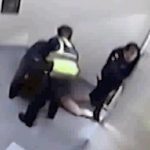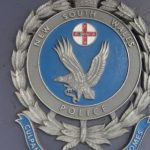Once Again, Police Are Investigating Allegations of Police Brutality

Officers from the NSW Police Standards Command (PSC) are currently investigating two incidents, where NSW police officers allegedly used excessive force in the south-eastern NSW region of Queanbeyan.
A call came through to Monaro police station on the evening of December 21, 2013, reporting that a violent home invasion had taken place and the perpetrators had fled in a green Holden Commodore.
Then senior constable, Lucie Litchfield, and two other constables, Patrick Hicks and Todd Finnegan, set out in pursuit.
Officers assault occupants of the wrong car
The trio pulled over a Commodore in West Queanbeyan, but it was the wrong vehicle.
One of the male officers asked the four men inside whether they had any weapons. Local removalist Rickey Caton produced a plastic dinosaur and said, “No, but I’ve got a dinosaur … roaaaar!”
Mr Caton was then pulled from the car, kicked in the legs, his face was shoved into the ground and he was handcuffed.
Another occupant, Adam Antram, was also removed from the car.
Mr Antram was crash tackled by one of the male officers, even though he had followed the instructions of constable Litchfield and was standing by a retaining wall.
The tackle drove Mr Antram into the wall where he hit his head and lost consciousness.
Both Caton and Antram were then taken to the police station, where they were charged with assaulting police and resisting arrest.
Officer Litchfield tells the truth
Constables Hicks and Finnegan gave a very different account of what took place on the night of the incident.
Mr Hicks, the officer who crash tackled Mr Antram, claimed he was forced to “check-drill” Antram, who he said was charging at constable Finnegan, as he was cuffing Mr Caton.
However, Ms Litchfield refused to toe the police line and supported the occupants of the car, confirming no attempt was made to assault the officers.
The evidence that Ms Litchfield gave in court on April 28 last year, made it clear her colleague’s statements were false, and resulted in the charges against the men being dropped.
The magistrate’s findings
On November 1, Kiama Magistrate Mark Douglass described the evidence provided by Ms Litchfield as “cogent and compelling.”
He also said the case against the men should never have been brought before the court.
The magistrate ordered police to pay Mr Caton and Antram more than $100,000 in legal costs – which means NSW taxpayers footed the bill for the officers’ misconduct.
Mr Caton and Mr Antram have now filed statements of claim against the NSW Police Force in the NSW District Court.
The Director of Public Prosecutions is currently considering whether there is sufficient evidence to charge officers Finnegan and Hicks with assault, perjury and perverting the course of justice.
The persecution of Ms Litchfield
The incident led to the end of Ms Litchfield’s career with the NSW Police Force.
Officers Hicks and Finnegan turned on Ms Litchfield once she gave her statement. Their anger spread throughout the Monaro Local Area Command, and Ms Litchfield says she was subjected to bullying and victimisation from all levels of staff, including senior officers.
The former senior constable described one incident where a copy of police policy regarding the protection of internal police complaints was left on her desk.
According to Ms Litchfield, this implied she needed protection because her life was in danger.
She says her formal complaint about the incident was not taken seriously by those investigating the matter.
She eventually resigned from her position, after it was made clear that she wouldn’t be able to transfer to another local area command.
Police officer pulls gun on a driver
Along with this incident, PSC officers are also investigating a case where a NSW police officer pulled a gun on a motorist who was allegedly trying to evade a random breath test in January last year.
Dash-cam footage shows the officer following the car, before the driver pulls over. The officer then draws his gun and tells the man to exit the vehicle.
The footage only emerged in July this year, when the driver’s lawyers produced it at the ACT Magistrates Court as they were fighting the driver’s mid-range drink-driving charge.
The incident occurred just inside the ACT border, and the driver’s criminal lawyer argued that the breathalyser was not registered under the territory’s law.
As the device wasn’t approved, the magistrate did not have to make a formal finding on whether the improper arrest justified the evidence obtained.
Mr McKenna filed a complaint with police about officer involved, senior constable Steven Hilhorst of Monaro local area command.
The “toxic” culture of the NSW Police Force
These incidents have once again shed light on the “toxic” culture that pervades the NSW Police Force.
Ms Litchfield says the culture emphasises protecting “your mates”, rather than revealing “the truth.”
“There is still a significant lack of respect for women in policing,” Ms Litchfield told the ABC this week. “There is an old-school mentality in relation to a brotherhood.”
Deborah Locke, a former NSW detective, said a “cowboy culture” is beginning to re-emerge in some local area commands.
A key witness at the Wood Royal commission into police corruption, Ms Locke has heard of “pockets of the boy’s club” returning, along with “bullying” and an attitude of “don’t speak out.”
However, this old school attitude is not restricted to rural areas. In recent weeks, reports of rampant homophobia in the force emerged at Sydney’s Newtown police station.
A group of three serving officers and one former senior constable are taking the Force to the NSW Civil and Administrative Tribunal and the Anti-discrimination Board on the basis that they were targeted for drug tests due to their sexual orientation.
Police will continue to investigate police
But as PSC officers conduct internal investigations into the Monaro local area command incidents, the incidents once again raise concerns about the effectiveness of police investigating their own.
Indeed, the police professional standards officers are a product of that same NSW police culture, and many believe the bias inherent in the force shapes their decision making – the product of which is that the vast majority of internal investigations clear police of any wrongdoing.
The NSW state government is currently in the process of establishing a new police oversight body called the Law Enforcement Conduct Commission.
Beginning on January 1 next year, the new police watchdog has already come under heavy criticism, as it will merely monitor police investigations, leaving police to continue to conduct investigations internally.
Receive all of our articles weekly
Authors

Paul Gregoire







